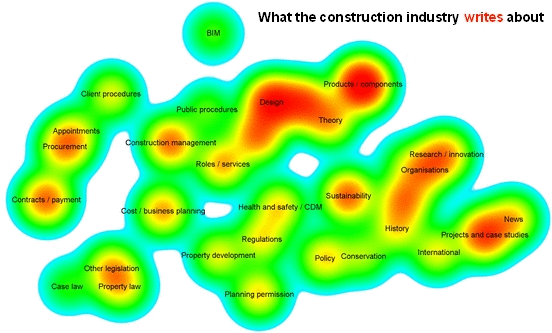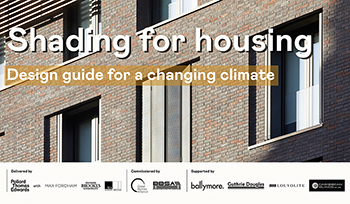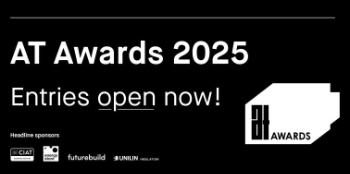Construction knowledge gap meeting
Contents |
[edit] Introduction
On 9 May 2018, 20 industry representatives met at the offices of BuroHappold in London to discuss the problems posed by the construction knowledge gap and to consider whether there was support for tackling these problems collaboratively. The attendees at the meeting were from a wide cross section of institutes, associations and consultancies.
Dr Gregor Harvie, co-founder of Designing Buildings Wiki set the scene, describing research carried out in 2017 which involved the analysis of 6 million pieces of data about the way people from every part of the industry create, share and use knowledge. He suggested this revealed a gap between the classic academic subjects the industry traditionally writes about (such as research, innovation, case studies and theory), and the practical, project-based subjects that today's practitioners actually want to read about (such as contracts, payment, procurement and construction management).

|
| Image: The construction knowledge gap. |
He suggested that this was the result of an out-of-date publishing model in which knowledge creation is driven from the top down, based on what publishers can easily write about and what they think people might need to know in the future, rather than a bottom up, demand driven model, that would provide people with what they actually want to know now.
He proposed that this situation would become worse as the use of small screen mobile devices increases, and literal, plain-language google searches and voice-activated queries become the norm. If the industry continues to publish knowledge as large-format pdf’s, with the practical findings obscured by academic language, people will start to find their answers elsewhere.
[edit] Speakers
Four speakers then talked about their experiences of the changing knowledge landscape:
- Rory Huston from BuroHappold discussed the transactional basis of knowledge donors and recipients, and the need to remove barriers from already over loaded design teams to help them apply best in class knowledge.
- Vicky Brown from BRE talked about the size and scope of the investment BRE makes into research, but warned that the uptake of publications was actually in decline. She highlighted BREEAM Wiki, recently launched on Designing Buildings Wiki, as one of the initiatives they are taking to try to reach practitioners in new ways.
- Dean Lenton from ICE explained the enormous scale of the knowledge held by ICE and the complexity of making this available to practitioners in a way that was useful to them. ICE are looking at a number of strategies to improve the usability of their knowledge, and this includes learning lessons from the ways other sectors engage with their audiences.
- Nick Sumption from i3P gave a practical example of how the infrastructure sector is already collaborating to encourage the creation of new knowledge. The Infrastructure Industry Innovation Platform (i3P) launched in 2016, building on the success of Innovate18, a systematic innovation programme to harness the creative potential of Crossrail and its supply chain. i3P now helps transform ideas into practical solutions; strategically directing innovation to address infrastructure challenges.

|
| Image: Vicky Brown from BRE talking about the challenges of knowledge dissemination. |
[edit] Possible solutions
Gregor Harvie then presented some potential solutions to the problem. These included:
- Carrying out more research to better understand the problem and what the potential solutions might be.
- Publishing standard, industry-wide templates and guidelines to help people commission, create and disseminate knowledge in a way that is more accessible and search engine friendly. An example of knowledge standard guidelines and a research findings template were discussed.
- Developing an industry-specific search engine that would search only pre-vetted websites, giving practitioners direct and easy access to the best, most current and most appropriate knowledge. A very simple custom search engine that searches only the websites of the attendees was demonstrated.
- Selecting an important, subject for which there is already a great deal of construction knowledge, but where that knowledge is not being applied, and re-purposing it to make it more practical and accessible.
- Identifying a subject for which more research or knowledge is required and working together to develop new, practical and accessible guidance for practitioners.
[edit] Break out session
Attendees then broke out into smaller groups to discuss the question: How can we ensure practitioners find the knowledge they need, when they need it, and in a useful format?
The conversations were lively, with a wide range of views expressed. There was concern from some that high quality knowledge is expensive to produce, and so it is necessary to charge for it. There was also concern about becoming a slave to google and search engine optimisation. Others saw a huge potential for industry collaboration to solve a common problem, and recognised an urgent need to satisfy practitioners' knowledge requirements in whatever format they come. There was broad support for the idea of creating an industry search engine, and perhaps an industry notice board, giving practitioners easy access to the latest and best knowledge, news, training and events.
[edit] Next steps
Feedback at the end of the meeting was very positive. There was a clear desire to take the idea of collaboration forward and a consensus that together we can ensure practitioners are informed by the best knowledge possible. Attendees were asked to consider joining a task group to build on the ideas discussed, and this will be organised soon.
The meeting was followed up with a survey, the results of which can be seen here.
To find out more or become involved, contact Gregor Harvie at: [email protected]
[edit] Related articles on Designing Buildings
- Construction industry knowledge standard.
- Fit for Purpose launch event.
- Fit for purpose - Big data reveals the construction knowledge gap.
- Knowledge gap survey responses.
- Research findings dissemination template.
[edit] External references
Featured articles and news
Shading for housing, a design guide
A look back at embedding a new culture of shading.
The Architectural Technology Awards
The AT Awards 2025 are open for entries!
ECA Blueprint for Electrification
The 'mosaic of interconnected challenges' and how to deliver the UK’s Transition to Clean Power.
Grenfell Tower Principal Contractor Award notice
Tower repair and maintenance contractor announced as demolition contractor.
Passivhaus social homes benefit from heat pump service
Sixteen new homes designed and built to achieve Passivhaus constructed in Dumfries & Galloway.
CABE Publishes Results of 2025 Building Control Survey
Concern over lack of understanding of how roles have changed since the introduction of the BSA 2022.
British Architectural Sculpture 1851-1951
A rich heritage of decorative and figurative sculpture. Book review.
A programme to tackle the lack of diversity.
Independent Building Control review panel
Five members of the newly established, Grenfell Tower Inquiry recommended, panel appointed.
Welsh Recharging Electrical Skills Charter progresses
ECA progressing on the ‘asks’ of the Recharging Electrical Skills Charter at the Senedd in Wales.
A brief history from 1890s to 2020s.
CIOB and CORBON combine forces
To elevate professional standards in Nigeria’s construction industry.
Amendment to the GB Energy Bill welcomed by ECA
Move prevents nationally-owned energy company from investing in solar panels produced by modern slavery.
Gregor Harvie argues that AI is state-sanctioned theft of IP.
Experimental AI housing target help for councils
Experimental AI could help councils meet housing targets by digitising records.
BSRIA Occupant Wellbeing survey BOW
Occupant satisfaction and wellbeing tool inc. physical environment, indoor facilities, functionality and accessibility.






















